S.C. Skillman's Blog, page 60
June 16, 2014
Comic Opera of Gilbert and Sullivan – the Great English Comic Theme of People Pretending To Be Better Than They Really Are
On Saturday evening I enjoyed watching and listening to a concert by the Warwick & Kenilworth Choral Society given in Kenilworth School, during which the choir performed Gilbert & Sullivan’s comic opera Trial by Jury.
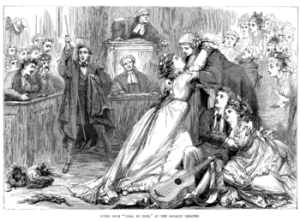
A scene from Trial By Jury as illustrated in the magazine Illustrated Sporting & Dramatic News of 1 May 1875
I have personal memories of Trial By Jury; during my childhood and teenage years I sang in a girls’ choir in Orpington, Kent. The Orpington Junior Singers, conducted by Sheila Mossman, were called upon to sing in The Chorus of Bridesmaids in Trial By Jury when it was performed by Sheila Mossman’s adult choir The Orpington Chorale (a choir which my father sang in, too, for several years).
It was such a joy on Saturday evening to sit in the audience on Saturday evening and watch the performance of this, the first collaboration between Gilbert & Sullivan (often regarded as the Victorian equivalent of Rice and Lloyd Webber).
As we watched the pompous insistence of the Judge on telling everyone how he came to be a judge, and how he himself cheated the rich attourney by jilting his elderly ugly daughter, (whose parents assured him she could very well pass for 43 in the dusk with the light behind her), and as we enjoyed the Defendant in his loud jacket offering to marry the jilted bride one day and his new girlfriend the next, I was reminded once again of the central comic theme which appears in every generation in English society: The theme of people trying to appear better than they are. Only in Gilbert & Sullivan part of the humour is that they openly reveal their true murky selves.
The Jury admits they were once irresponsible cads, just like the Defendant; but now of course they’ve given that all up and they “shine with a virtue resplendent”.
We delight in seeing these themes played out before us. It is such a recognizable “trope” and we love it. Jane Austen thrived on it and found in it a fertile source of irony.
Class consciousness is a constantly-renewable resource for English writers, and long has it been so.
Do you recognise this as a strong theme in any of your favourite writers? Please share in the comments!
Filed under: British, culture, inspiration, life, literature, music, musings, popular music, psychology, SC Skillman, SC Skillman Author, stage drama, thoughts, UK, Writing Tagged: class consciousness, comic trope, English writers, Gilbert & Sullivan, great English comic theme, Orpington Chorale, Orpington Junior Singers, Rice Lloyd Webber, SC Skillman, Sheila Mossman


June 12, 2014
In Commemoration of Anne Frank on the 85th Anniversary of Her Birth: the Power of the Pen, Mightier Than the Sword
Today (12 June 2014) is the 85th anniversary of Anne Frank’s birth.
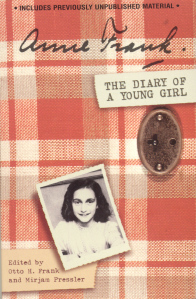
Anne Frank: The Diary of a Young Girl – Otto Frank and Mirjam Pressler
Coincidentally – or maybe, by synchronicity, for I was unaware of the significance of this date at the time – I only just finished reading The Diary of Anne Frank all over again, two days before writing this post.
I first read Anne Frank’s diary when I was a young teenager and such was the effect it had on me, I still have a strong visual memory of a walk I took in our local park, immediately after finishing the book. When I read the book recently, I relived that walk through the alleyway into Goddington Park, Orpington. I remembered being there, and as I walked, and looked at everything around me, I thought continually about Anne Frank and the relationship she was developing with Peter, one of the other fugitives in The Secret Annexe.
Anne Frank’s diary is particularly meaningful to me because I too kept a daily journal at approximately the same age as Anne. I too began my journal in a book I had received as a gift; but I started my journal when I was 15 years old (the age Anne was when she died in Bergen-Belsen) and I continued writing it for 10 years.
As I read Anne’s diary I identify with her so much. She writes just what she feels about things, she spares no details, she is honest about her own personal experience as an adolescent girl. People have commented on Anne’s sharp and critical remarks about others in the Annexe including her own mother. But I understand Anne perfectly.
What is a secret journal for, if it isn’t to write down exactly w hat you think and feel about everything and everyone?
The most poignant parts of Anne’s diary for me come when she speculates about her future. Sometimes she is full of hope, and she writes about what she will do after the war, and is excited at the hope of the war ending in 1944; by October, she thinks, she will be so happy to be back at school! (In fact, by then she was in Auschwitz). A very moving part of the diary is when Anne records that Miep, one of their helpers, gave them a cake for Christmas 1943 and had written on it “Peace 1944″. Then you compare that with what the year 1944 actually held for them all.
Then Anne is filled with a sense that they are all doomed, and will themselves fall victim to the terrible persecution of the Jews by the Nazis. She describes feeling that she and all the others in the annexe are a tiny piece of bright blue sky, surrounded by a ring, and all about that ring are black, threatening clouds, moving closer and closer to overwhelm them. She writes that she feels the ring is shrinking all the time.
The most heartrending part of reading Anne Frank’s diary is when you read the brief account at the very end about what happened to each of the fugitives in the Secret Annexe, after they were arrested on 4 August 1944.
Anne is in one sense so ordinary, it is so easy to identify with her, she comes over as intensely alive and vivid and real, you feel you know her intimately. Then you meditate upon what she and her fellow fugitives suffered as they were discovered and arrested; and you imagine what Anne would have continued to write, about every detail of her subsequent experiences.
Anne’s story tells us about the power of the pen – mightier than the sword. With one personal diary, she has come to symbolize the suffering of the Jews for millions, over all the intervening decades up to the present day, and her witness gathers strength for each passing generation.
Share what Anne Frank means to you on #anne frank2014 on Twitter, or on Facebook.
Filed under: About Books I love, Authors I love, book reviews, Books, history, inspiration, life, musings, news, people of inspiration, SC Skillman, SC Skillman Author, thoughts, Writing Tagged: 12 June 2014, 85th anniversary of Anne Frank's birth, Anne Frank, Jews, Nazi, personal diary, power of the pen, SC Skillman, suffering


June 9, 2014
Supernatural Power versus Rationalism: Sorcerers and Sceptics at Warwick Words Summer Festival 2014
Last night I went to a fascinating discussion between two authors at the final event of the Warwick Words summer festival. The talk was held in the beautiful 15th century Great Hall of the Lord Leycester Hospital, Warwick.
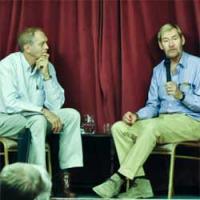
Andrew Taylor and Ian Mathie (photo credit warwickwords.co.uk)
Ian Mathie, author of Sorcerers and Orange Peel, spoke about his travels in remote African communities over many years and his experiences of spiritual power among the witchdoctors, some of which he believed could not be explained in rational terms. He was being challenged by the sceptical James Andrew Taylor, biographer, former TV journalist and author of Walking Wounded, an acclaimed biography of poet Vernon Scannell.
Each author gave his point of view upon the existence of the paranormal and the supernatural, then the debate was thrown open to the audience. I was interested to note that several among those who spoke from the audience had extensive experience of Africa, and that the general feeling among them seemed to be open-minded/sympathetic towards Ian Mathie’s point of view. I had expected many more sceptics. One questioner asked “What is reality?”
Andrew Taylor said reality was what he could experience with his senses. Then the questioner pointed out that our view of reality changes all the time; our reality in 2014 would have been considered unbelievable one hundred years ago; microscopic reality is unknown to the majority of us; and we are unable to say what new “realities” may become commonplace to those who live a hundred years in the future, that we now consider impossible.
Andrew Taylor made three intriguing points. He said:
1) he would only consider something to be “reality” if it was repeatable in laboratory conditions.
2) he considered “magic” to be lazy; the way things are achieved in the “real” world is far more complex and interesting.
3) everything Ian Mathie had witnessed in traditional communities in Africa, which appeared to be achieved by supernatural power, he would say is all down to “the power of suggestion”.
I later asked Ian Mathie whether he saw anything equivalent to “the local witchdoctor” or “wise man/woman” anywhere in our contemporary English society.
He said no – and this is because most of us in our western culture have such a reductionist, rationalist outlook upon the world, that we are not open to such supernatural power.
I too have been drawn to Africa in a number of ways over the years, mostly through books, without ever having visited the continent; and I learned that Ian Mathie had met Laurens Van Der Post, as I too have done. See my blog post on Van Der Post here.
In my forthcoming psycho-spiritual suspense novel A Passionate Spirit:
1) one of my principal characters wields such supernatural power – in the heart of a contemporary English community.
2) the test of the reality of her power is met; she repeats her apparently supernatural acts over and over again.
3) her power is not taken seriously by those who we might consider most likely to be alert to it – in our society.
If you are interested in these things - the existence of supernatural/spiritual power, versus the rationalist outlook of our Western society – or have experiences or views about it, I invite your comments.
Filed under: About Books I love, Authors I love, Books, British, British psychological suspense writer, culture, inspiration, life, literature, musings, people of inspiration, psychology, religion, SC Skillman, SC Skillman Author, spirituality, thoughts, travel, UK, Writing Tagged: a passionate spirit, Africa, contemporary English, literary festival, magic, rationalism, reality, SC Skillman, sorcery, spiritual power, supernatural power, traditional, Warwick Words


June 2, 2014
Inspiration From the Parapet at the Top of the Tower of St Mary’s Church Warwick
As I sit here typing these words I gaze over the trees to the top of the tower of St Mary’s Church Warwick.

St Mary’s Warwick (photo credit http://www.stmaryswarwick.org.uk)
The decorated parapet at the top of this tower is the highest place you can be in Warwick (which is this year celebrating its 1100th anniversary). I’ve climbed to that platform and gazed down over the Beauchamp Tower of Warwick Castle.
We live on a hill to the north of Warwick town centre and following our neighbours’ removal of some trees, we now have a new view across to that tower. I can see it now from where I sit as I type these words. I find it uplifting and inspiring.
The tower of St Mary’s can be discerned from miles away. It’s the first landmark which announces that you’re approaching Warwick, when you travel from Stratford-upon-Avon.
As someone who loves history, I like to imagine how it would have been for those approaching many hundreds of years ago, as they first caught a glimpse of that tower and said, “There’s Warwick!”
Warwick has a number of claims to fame in English history; we may think of Richard Neville, known as Warwick the Kingmaker (as Sellars and Yeatman remark in their comic classic 1066 And All That, “any baron who wished to be considered king was allowed to apply at Warwick the Kingmaker’s, where he was made to fill up a form“); we may think of that treacherous crime that was committed, when Piers Gaveston the King’s favourite was lured to Warwick Castle by the Earl of Warwick and ended up being dragged to Blacklow Hill and horribly slaughtered. An Earl of Warwick was responsible, too, for the trial and sentencing to death by burning at the stake for Joan of Arc. This area is rich in history.
Most tourists coming to the Midlands head first to Stratford-upon-Avon and then to Warwick. And after Warwick Castle, St Mary’s Church is for the majority of visitors their next stop. It has the beautiful Beauchamp Chapel, where, among others, is the tomb of Sir Robert Dudley Earl of Leicester, favourite of Queen Elizabeth I; and also, in the adjoining Chapter House, the tomb of the ill-fated Sir Fulke Greville, who was murdered by his manservant in Warwick Castle.
Perhaps the view of that tower connects me to a sense of story, and that’s why it inspires me so much.
What do you think? Do you too feel inspired by mediaeval churches, castles, and other historical places? Why do you think we love them together with all their associated stories of past misdeeds and treachery?
Filed under: British, buildings, culture, history, inspiration, life, love, musings, places I love, SC Skillman, SC Skillman Author, thoughts, UK, Writing Tagged: a sense of story, English history, inspiration, inspiration from the parapet, inspiring, love, new view, parapet, SC Skillman, St Mary's Church Warwick, top of the tower, uplifting


May 26, 2014
Do Novelists Have an Agenda or a Moral Purpose?
This morning on BBC Radio 4′s Start the Week programme I listened to a fascinating panel discussion from the Charleston Festival. Tom Sutcliffe questioned four novelists: Tim Winton, Nicola Barker, Michael Schmidt and Karl Knausgaard.
Two of the questions Tom Sutcliffe asked were:
Do novelists have an agenda or a moral purpose?
Do you as a novelist have a moral obligation to your subject?
The answer seemed to be no.
Nicola Barker said that she felt writing a novel is about engaging with the text and the words, and the story is driven forward by “the energy of the moment”, not by any moral purpose whatsoever. She said she starts writing and “a spirit of mischief” overwhelms her.
The novelist embroiders reality to make it habitable; for a fiction writer it’s true to say, “I might not like the world of my story but it’s a world I own.”
I found this discussion interesting because I believe that in writing a novel it is fatal to the story to try and make the story comply with any conscious “moral purpose” on the part of the author.
This feeds interestingly into how one can write a novel that is issue-driven rather than character-driven. And also, how do creative writers write in despotic regimes? How do you create a fictional world, peopled by fictional characters, and ensure that what you say is in line with the agenda of that regime?
From my experience I find that the only imperative as a story develops is to follow where my principal characters lead, as their inner purpose becomes clearer and clearer to me.
My new novel, A Passionate Spirit (psycho-spiritual suspense) is now being considered by a publisher. The theme of the novel is conflict between good and evil. And as my characters revealed more of themselves, I realised that there were several ways I could end the novel, and whichever one I chose would be saying something different about the nature of evil.
In my first novel Mystical Circles, I now wish I could have followed John Fowles’ lead in A French Lieutenant’s Woman, and given three alternative endings.
I’ve learned through experience one of the snares a novelist should avoid: to write the ending you think your readers want to see, or expect to see, based upon the feedback of early readers.
A novelist’s only moral obligation is to the inner truth of the characters.
Filed under: Books, British, literature, media, Mystical Circles, SC Skillman, SC Skillman Author, spirituality, thoughts, UK, Writing Tagged: a passionate spirit, good and evil, mystical circles, novel, novelist, novelists moral purpose, psychospiritual suspense, SC Skillman, spirit, spiritual


May 19, 2014
Harmony, the Music of the Spheres and Glimpses of Eternity
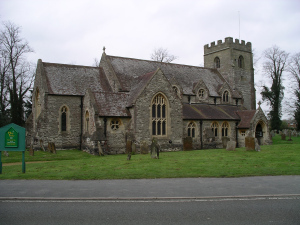
Holy Trinity Church, Hatton, Warwickshire (creative commons)
The other day I was at an inspirational concert in a village church in Warwickshire, Hatton Church, listening to a small choir called Amici sing a mixture of early music and contemporary music.
They sang a capella music by such composers as William Byrd, Orlando Gibbons and Ralph Vaughan Williams. On one occasion the conductor pointed out that five hundred years separated the composers of the two pieces they were about to sing.
The loveliest pieces I heard were Alleluia, I heard a voice by Thomas Weelkes (1576-1623); A Spotless Rose by Paul Mealor (b. 1975); Hail Gladdening Light by Charles Wood (1866-1926), Northern Lights by Ola Gjeilo (b. 1978) and Lux Aurumque by Eric Whitacre (b. 1970).
As I listened to the glorious harmonies that the singers created I found myself gazing up to the stained glass windows high above the altar. Listening to music like this is like a portal into another world, a higher spiritual dimension, opened up by the singers who produce those exquisite sounds.
Then I thought, this must be what the Music of the Spheres is like. Many authors have explored the idea of the music of the spheres, “a universe bursting with music”. And this concert by Amici brought it to my mind again.
We all have the capacity to create heaven on earth with our voices, creating harmonies that are sublime. I experience this occasionally with the Leamington Spa community choir Songlines.
Never forget that the greatest of instruments is the human voice.
Filed under: inspiration, life, music, musings, places of inspiration, religion, SC Skillman, SC Skillman Author, spirituality, UK Tagged: Amici, concert, creating, glimpses of eternity, harmonies, harmony, heaven on earth, Holy Trinity Church Hatton Warwickshire, inspirational, love, music, music of the spheres, SC Skillman, Songlines, spiritual, sublime


May 13, 2014
Wordsmith Vision on Mystical Circles
Wordsmith Vision on Mystical Circles.
Filed under: book reviews, Books, British, British psychological suspense writer, literature, Mystical Circles, psychological suspense fiction, SC Skillman, SC Skillman Author Tagged: book reviews, mystical circles, SC Skillman


May 12, 2014
Hope That Eurovision Might Value Performers for Their Own Sake and Not for Their Country’s Politics
I was pleased to see Austria’s win in the Eurovision Song contest 2014. Not only was there the pleasure in seeing a country win that had not seen success at Eurovision for 49 years, but also I thought it a genuinely good song, performed beautifully by Conchita Wurst who has a wonderful voice.
The standard this year was very high and I enjoyed several of the songs and performers. I don’t judge by politics, but by the performance alone, and the performances submitted by Russia and Ukraine were amongst those I personally believed to be the best. The current political situation between those two countries, to me, was irrelevant to the criteria for choice.
Many people love the Eurovision Song Contest, for different reasons; but I hope we have seen signs this year that we may be moving in the direction of valuing talented performers and high quality songs for their own sake alone.
Filed under: life, love, media, musings, news, people of inspiration, popular artists, SC Skillman, SC Skillman Author, thoughts, TV programmes Tagged: Austria, Conchita Wurst, Eurovision song Contest 2014, hope, love, pleasure, SC Skillman, talented, value performers, win


May 5, 2014
Kairos Moments in Life – Broken Priests and More Insights from BBC TV sitcom ‘Rev’
As I think again about the BBC TV sitcom Rev the word ‘wrecked ‘ comes to my mind.
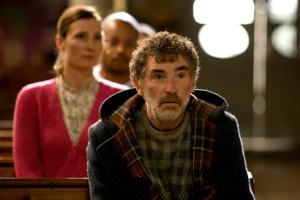
Steve Evets as Colin in Rev photo credit bbc.co.uk
Probably my favourite character in Rev is Colin the local vagrant, brilliantly played by . I described him as a philosopher tramp in my previous post on Rev.
But there is a much darker side to Colin, than that of simply providing an amusing foil to the religious self-doubt of Adam. Colin is, in many ways ‘wrecked’. Alcoholic, drug addict, prone to outbreaks of violence when he’s ‘under the influence’, even against those who have previously helped and supported him, he has adopted an equally derelict dog called Bongo as his faithful companion.
In the final episode of the 3rd series we saw Adam in bed with depression, broken in spirit, having been betrayed by several people, Colin among them. Then Colin turns up at the door with Bongo in his arms. Bongo has died – because Colin himself ignored advice and fed him a chocolate Easter egg stolen from the local store.
At this lowest moment, Colin comes to the priest and finds only his wife Alex, not known for her own religious devotion.
“You can do a Bongo funeral can’t you Mrs Vicarage?”
To me, this was the most heart-breaking moment of the entire series.
Alex finds herself put on the spot, helps Colin bury Bongo outside their house, and says a few kind words about Bongo. Then she offers that they say the Lord’s Prayer together.
To me, in Rev, this is a Kairos moment – a moment when the very highest shines through in the very lowest.
When in his most vulnerable, wrecked, broken state, this vagrant goes to the one person who can somehow bring some divine perspective into his pain – even though that person is himself broken.
I believe this is the heart of the Christian faith and what Christ was all about.
We all need some divine perspective in our very lowest moments. Thank you to all those who helped to create Rev, and give us this among many other insights.
Filed under: interpersonal relationships, life, media, musings, religion, SC Skillman, spirituality, thoughts, TV programmes Tagged: BBC TV sitcom, Christ, Christian, divine perspective, Kairos moments, priests, religious, Rev, SC Skillman, spirit, Steve Evets


April 28, 2014
Holywell Retreat, A Place of Spiritual Inspiration on the Sussex Coast
I’ve written before in this blog about those sacred spaces which are known in Ancient Celtic terms as thin places.

View of Beachy Head from Holywell Retreat – photo credit Abigail Robinson
These are places where you are led to believe that the veil between the visible and the invisible worlds is thin. They don’t have to be obviously religious places. In fact once I read of someone who had a religious experience whilst crossing London Bridge in the rush hour. For that person, London Bridge became a thin place.
A thin place may be any place where you have new or happy or inspirational thoughts.
But quite often, probably because our ability to tune into spiritual inspiration is hindered by stress, anxiety, tension and so on, our thin places are literally places of tranquillity where we can move apart from the preoccupations of our daily life.

the beach at Holywell Retreat – photo credit Abigail Robinson
Such a place for me, recently, was Holywell Retreat between Eastbourne and Beachy Head. I was there with a friend and my two teenage children just a few days ago.
The weather was mild and warm, the atmosphere still and hushed. A few people were around, but it wasn’t crowded. This was the end of the Easter holiday, and not yet the high season for tourism in Eastbourne. The sea washed over the stony beach. The white cliffs of Beachy Head were directly ahead of us.
A few people sat on benches watching the sea. It occurred to me that, had I not been planning to drive back to Warwick in a couple of hours, I could happily have stayed there all day in this dreamlike state, feeling the warmth on my skin, listening to the murmur of the sea against the pebbles on the beach, gazing at the white cliffs stretching out to the horizon.
Everything that might cause me anxiety melted away. And above all, I was present in the moment. So were my two children, as they wandered around the beach, and so too was my friend. I dare to believe that each one of us was living fully in the present, as you do in the space between sleeping and waking, when your dreams still linger with you.
Do you have a thin place? Or perhaps it is so special to you that you don’t want to reveal its location! Please share in the comments.
Filed under: British coastline, dreams and dreaming, inspiration, life, places I love, SC Skillman, spirituality, thoughts, UK Tagged: dare to believe, dreams, happy thoughts, I believe that, in this life, inspirational, inspirational thoughts, new thoughts, sacred spaces, spiritual inspiration





